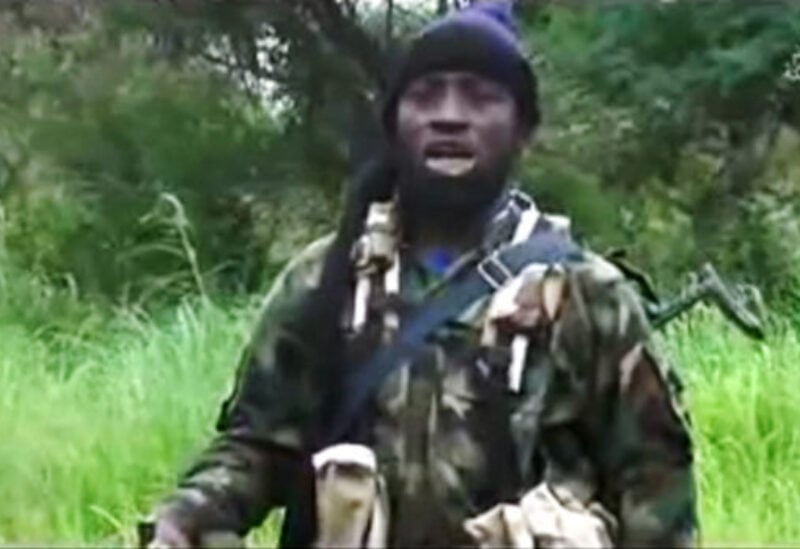
Boko Haram leader Abubakar Shekau
Boko Haram’s leader Abubakar Shekau killed himself in a fight against rival jihadist fighters, the militant group Daesh West African Province (ISWAP) said in an audio recording heard by Reuters on Sunday. Shekau died around May 18 after detonating an explosive device when he was pursued by ISWAP fighters following a battle, a person purporting to be ISWAP leader Abu Musab Al-Barnawi said on the audio recording.
“Abubakar Shekau, God has judged him by sending him to heaven,” he can be heard saying.
Two people familiar with Al-Barnawi told Reuters the voice on the recording was that of the ISWAP leader.
Shekau’s death could lead to the end of a violent rivalry between the two groups, enabling ISWAP to absorb Boko Haram fighters and consolidate its hold on territory in northeastern Nigeria, political analysts said.
That would allow ISWAP to focus its attention on the government and military, whose war efforts are languishing.
In the audio recording, the man identified as Al-Barnawi said his fighters had sought out the warlord on the orders of Daesh leadership, and battled Boko Haram insurgents until Shekau fled.
Eventually, ISWAP chased him down and offered him the chance to repent and join them, he said.
“From there he retreated and escaped, ran and roamed the bushes for five days. However, the fighters kept searching and hunting for him before they were able to locate him,” the voice said.
After finding him in the bush, ISWAP fighters urged him and his followers to repent, the voice added, but Shekau refused and killed himself.
“Shekau preferred to be humiliated in the afterlife than getting humiliated on earth, and he killed himself instantly by detonating an explosive,” he said.
Shekau led the transformation of Boko Haram from an underground extremist sect in 2009 to a full-fledged insurgency, killing, kidnapping and looting its way across northeast Nigeria.
The group has killed more than 30,000 people, forced around 2 million people to flee their homes and spawned one of the world’s worst humanitarian crises.
ISWAP was previously part of Boko Haram before its split five years ago, pledging allegiance to Daesh. The schism was caused by religious ideological disagreements over the killing of civilians by Boko Haram, to which ISWAP objected.
“We are so happy,” the voice said, describing Shekau as “the big troublemaker, persecutor and destructive leader of the nation.”
“This was someone who committed unimaginable terrorism and atrocities. For how long has he been leading people astray? How many times has he destroyed and abused people?” the voice said.
Boko Haram has not yet officially commented on the death of their leader, who waged a more than decade-long insurgency in northeast Nigeria, while the Nigerian army said it was investigating the claim.
In the past two years, ISWAP emerged as the more dominant force in the region, carrying out large-scale attacks against the Nigerian military.
As the group now looks to absorb Shekau’s fighters and territory, Nigeria’s army potentially faces a more unified jihadist force, analysts say.
But ISWAP may also struggle to control or persuade Boko Haram factions loyal to Shekau outside Sambisa, especially in border areas.
“It may not be over yet,” one security source said. “ISWAP will have to subdue or convince these camps to coalesce (them) into its fold to fully consolidate its control.”
Extremist infighting may present opportunities for Nigeria’s army to seize.
But should ISWAP absorb part of Shekau’s men and weapons, it might be in a position to cut off roads to and from the Borno state capital Maiduguri, said Peccavi Consulting, a risk group specializing in Africa.
“If ISWAP convinces Shekau’s forces to join them, they will be controlling the majority of the enemy forces as well as having a presence in most of the ungoverned spaces in the northeast,” it said in a note.
Since 2019, Nigeria’s army has pulled out of villages and smaller bases to hunker down in so-called “supercamps,” a strategy critics say allows jihadists to roam free in rural areas.
Following its takeover of Sambisa, ISWAP sent messages to locals in the Lake Chad region, telling them they were welcome to its self-declared “caliphate,” said Sallau Arzika, a fisherman from Baga.
Locals were chased out of the lake islands after ISWAP accused them of spying for the military. Al-Barnawi said they could now return for fishing and trading after paying tax, with the assurance they would not be harmed, Arzika said.